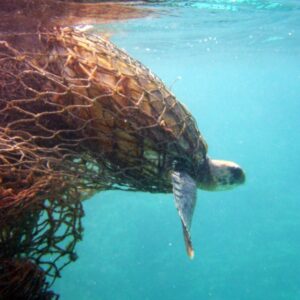Richardson, K., et al. (2022). “Global estimates of fishing gear lost to the ocean each year.” Science Advances 8(41): eabq0135.
The Problem
Abandoned, lost or discarded fishing gear, better known as ‘ghost gear’ or ‘derelict fishing gear,’ is contributing to marine pollution, but to what degree? The lost gear floats through the ocean for decades, entangling marine animals and damaging important bottom habitats. Many scientists and managers have acknowledged the problem, but the scale of pollution has only now been properly quantified.
What’d they do?
Researchers at the University of Tasmania surveyed 451 fishers from around the world about their gear usage and loss and compared those data to global fisheries data. Different types of fishing gear, such as longlines and crab pots, were taken into consideration along with vessel size and how often ships go to sea.
The data revealed that about 2% of fishing gear is lost annually from fishing vessels. The amount of loss for each type of gear is broken down in the report and discloses overwhelming numbers. More than 25 million crab pots and lobster traps and over 13 billion longline hooks are lost from vessels each year.

That’s a lot of gear!
This report provides perspective on the amount of ghost gear haunting our oceans with some scary estimates. Ghost puns aside, derelict fishing gear poses a threat to marine life such as sharks and rays whose populations have declined greatly as they are trapped by lost fishing gear. Although derelict fishing gear is an intimidating problem, we now know the magnitude. The only solution is to move forward with improving management and prevention strategies to account for the much larger amounts of ghost gear than previously estimated. Fisheries management will be the key to resolving this issue and some measures have already been put into place. Gear can be marked, tracked, and reported when lost. Some researchers and volunteer programs work to remove lost gear using dive teams and collection on ships, helping to curb the input of debris in the ocean. Cleanup efforts now have a baseline for tracking derelict fishing gear and can work to modify policy decisions for fisheries management.
I am a PhD candidate at the University of Connecticut-Avery Point exploring the dynamic interactions of microplastics and suspension feeding invertebrates. Through both field and laboratory work, I am working to understand which kinds of microplastics (different shapes, sizes, compositions) oysters, mussels, tunicates, and slippersnails consume and determine which species can be used to monitor microplastic pollution in our coastal waters. When I am not working on my research, I enjoy hiking with my husband and pup, being near or in the water, and spending time with family and friends.

